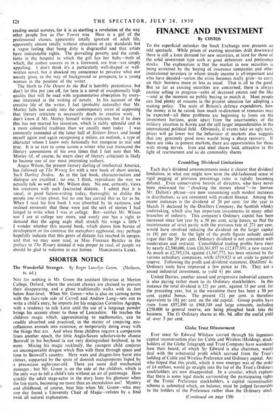SHORTER NOTICE
NOT for nothing is Mr. Green the assistant librarian at Merton College, Oxford, where the ancient classics are chained to prevent their disappearing, and a ghost traditionally walks with its feet below floor-level. When Mr. Green—who is also on yarning terms with the fairy-tale side of Carroll and Andrew Lang—sets out to write a child's story, he imports for his magician Cornelius Agrippa, with a tendency to talk Latin until the use ora language powder brings his accents closer to those of Lancashire. He teaches the children magic which, approximating to mathematics, can be readily absorbed and practised, in the matter of conjuring mis- cellaneous animals into existence, or temporarily doing away with the things that are. And' when these children require a companion from another epoch, the little Anglo-Saxon scholars-to-be choose Beowulf in his boyhood (a not very distinguished boyhood, to be sure). Mixing his magic recklessly, the youngest child conjures an unconquerable dragon which flies with them through space and time to Beowulf's country. Here wars and dragon-lore burst into climax, supported by the spate of donnish malapropisms lisped by a precocious eight-year-old. There are some dull mechanical passages ; but Mr. Green is on the side of the children, which is the only way to tell a child's tale without an air of patronage. How quickly the adult stage-actor in the story loses his glamour when the fun starts, becoming no more than an incredulous ass! Mystery and childhood, of course, beat him when Mr. Green—who may one day found a University Chair of Magic=refutes by a final twist all natural explanation.


































 Previous page
Previous page